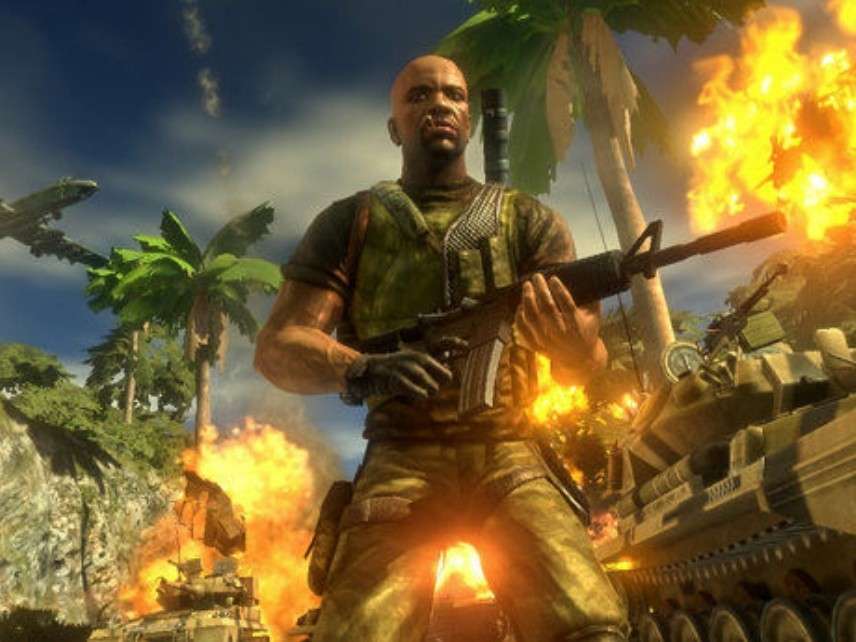This 2008 Video Game Is an Oddly Prescient Cautionary Tale About Venezuelan Intervention
In Mercenaries 2, China and the U.S. fight over pieces of Venezuela, before the entire country is wrecked by a nuclear warhead.

After the events of the past week, Venezuela seems ready to combust. With National Security Advisor John Bolton declaring that "All options are on the table" and powerful international blocs forming behind President Nicolas Maduro and his newly inaugurated rival Juan Guaido, it now seems possible that the U.S. might find itself drawn into a Venezuelan civil war, perhaps even to the point of putting boots on the ground.
What happens next is anyone's guess. One set of predictions, which at this point is about as good as any other, can be found in the 2008 video game Mercenaries 2: World in Flames.
In Mercenaries 2, the player assumes control of a mercenary hired by Venezuelan gangster and businessman Ramon Solano to help him overthrow the government. Solano then double-crosses the mercenary and carries out his coup, installing himself as a president "for the people" and nationalizing the country's oil industry (which, although the game is set in present day, actually happened in 1976). The mercenary swears revenge.
Following Solano's takeover, armed conflict quickly breaks out between the Venezuelan army, the hard-left People's Liberation Army of Venezuela (PLAV), and private security forces hired by the American oil company Universal Petroleum to defend their assets from government takeover. The player is free to work with either of these factions to destabilize Solano's government.
Most missions involve blowing things up, frequently in the heavily populated capital city of Caracas. Killing a civilian costs the player $10,000, but the mission parameters often make it difficult to avoid, and in the in-game economy, $10,000 isn't really that much.
Over the course of a single playthrough, I'd guess I killed about 100 civilians, mostly with poorly aimed airstrikes, a favorite tool of foreign invaders hesitant to risk their own troops. In Iraq, American-led coalition forces killed over 14,000 civilians between 2003 and 2011, and just like in Mercenaries 2, a majority of those deaths were caused by airstrikes.
As Solano becomes more aggressive, the U.S. and China invade Venezuela in order to ensure a reliable supply of oil. In our world, I doubt there's any danger of the U.S. and China going to war over Venezuela, but the U.S. decision to support Guaido while China backs Maduro could place more stress on a diplomatic relationship already strained by an ongoing trade war.
In Mercenaries 2, the direct involvement of foreign superpowers introduces (or "unlocks") larger and deadlier vehicles and munitions that can make mincemeat of a skyscraper in seconds. In the same way, America's long war in Afghanistan has flooded that country with advanced weaponry, destroying infrastructure and all but guaranteeing that any post-withdrawal conflict will be, in the words of one analyst, "very bloody and very long."
The fictional Venezuelan crisis then reaches its apex when Solano uses a North Korean nuclear warhead to destroy either the American or Chinese headquarters (depending on which faction the player has chosen), after which the mercenary quickly tracks down and kills Solano. Maduro has no nuclear weapons, and even if he did, it is obviously unlikely that that he would risk irradiating his own country, but warfare often devastates the environment in other ways. In Iraq, for example, oil fires and other forms of "conflict pollution" have damaged air quality and led to shortages of clean water.
The game's masterstroke, though, comes in the final cutscene. Although Mercenaries 2 opens with a big-picture cinematic that sets the geopolitical scene, the story ends with the team of mercenaries congratulating each other. Nobody says a word about the future of Venezuela. Now that the country has been utterly destabilized, its cities bombed, its people slaughtered, and its land and water irradiated, nobody asks how the country they've so gleefully destroyed might be rebuilt. As with so many other wars of regime change, the foreign meddlers can leave, while the newly "liberated" Venezuelans are left picking up the pieces.
Regime change might seem like a good idea, but as Mercenaries 2 shows, it frequently leads to entanglement, destruction, and chaos. Would Venezuela be better off without Maduro? Certainly. But if America's leaders allow themselves to be drawn into a Venezuelan civil war, their decision to support Guaido could end with Venezuela in flames.
